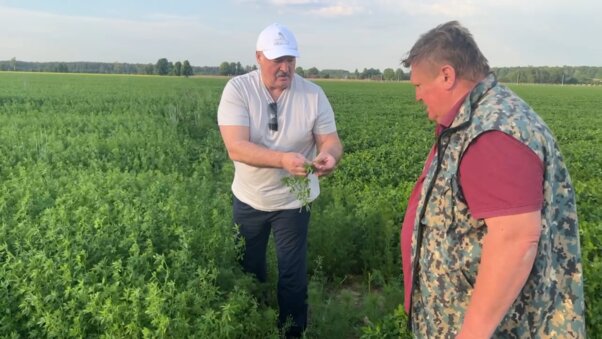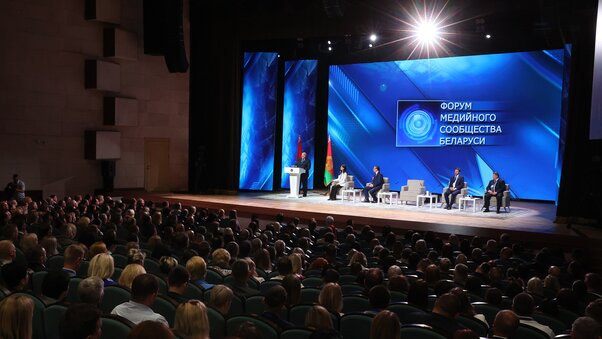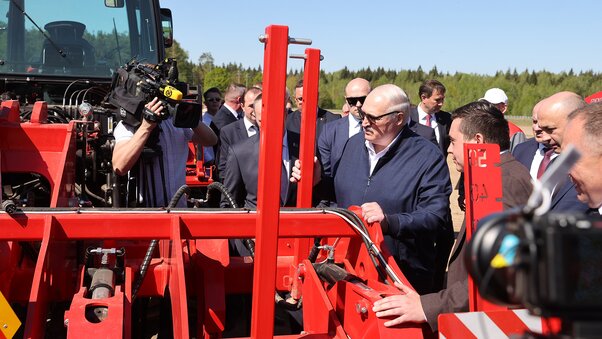Working trip to Dzerzhinsk District
- 41
- 2
Belarusian President Aleksandr Lukashenko went on a working trip to Dzerzhinsk District, Minsk Oblast, on 21 June.
During the trip, the head of state focused on the state of things in agriculture and on social matters.
Aleksandr Lukashenko reviewed progress to fulfill his instruction to build modern dairy complexes in Minsk Oblast and visited Lyakhovichi dairy farm of the Krutogorye-Petkovichi agricultural enterprise in Dzerzhinsk District.
He explained why he decided to come to the dairy farm.
The head of state noted that this is a new thing: the complex in Dzerzhinsk District is one of 20 facilities in the region, the construction of which was financed from the Minsk budget. In fact, Minsk consumes a significant part of products made in the region, therefore, it needs to help agricultural workers.
It is possible that a similar practice, but in a smaller scale, will be extended to other regions. “Minsk consumes products not only from Minsk Oblast, but also from Brest Oblast, Grodno Oblast, and other regions. Thus, when other governors learned that 20 dairy complexes were built here, they were frustrated: “Why in Minsk Oblast, and not in Brest Oblast...?” Indeed, why? Minsk consumes milk from Brest. Vladimir Yevgenievich [Minsk Mayor Vladimir Kukharev] implored: give me a year to finish things in Minsk Oblast, and then I’ll help build 1-1.5 complexes in other regions so that the other governors will not begrudge the Minsk Oblast governor,” said the head of state.
The second reason for the visit was that the complex in Dzerzhinsk District turned out to be optimal and relatively cheap to build. “This is the cheapest complex in the country. This is very important for us. We are commissioning more than a hundred complexes across the country this year. We need to clearly understand how much they cost us. If your complex is indeed the cheapest (it looks like that), we need to build more such complexes throughout the country. We don’t need complexes with bells and whistles, extravagant architecture and so on. Just a nice design, a good complex. A beautiful, normal project. We will replicate it throughout the country,” Aleksandr Lukashenko instructed.
The President emphasized the importance of building more dairy complexes like this: “We will not drop the construction of such complexes. If someone frets and giggles saying ‘here we go again with these complexes’... Again! All the milk produced here is of premium quality. Our people, including children, drink it. That’s why we have to move away from small farms towards building more such complexes.”
“It seems that over this time we have figured out how to build, where to build. In fact, crop production depends on the livestock complex,” the Belarusian leader emphasized.
The complex is designed for more than 1,100 dairy cows (three barns with 388 cattle places each). Intensive technology is used here and all production processes are automated. This allows producing equal amounts of milk all the year round.
The Lyakhovichi dairy complex is set to produce 9,428 tonnes of milk per year, with the milk yield per cow at 8,100 kg.
Minsk Oblast Governor Aleksandr Turchin explained how it was possible to cut costs during the construction. When existing old farms are transformed into dairy complexes, there is no need to build infrastructure from scratch, so this is not a greenfield project. “Plus, the facility remains operational during this time, generating money and revenue. We don’t have to wait two years to build a new facility and another year to buy equipment for it, while repaying loans,” he noted.
It has turned out that when cattle are relocated from old farms to new dairy complexes, their productivity increases within a short period of time.
It was also possible to save on design and estimate documentation, because a standard design was used for all 20 complexes. There was only one case when the design had to be adjusted to fit a specific location. And many construction works were done by the enterprise’s own workforce.
Aleksandr Lukashenko urged to make long-term calculations of logistics costs and not rely indefinitely on existing infrastructure: “Indeed, construction will cost you less. But if livestock farming is concentrated in one place, you will have to transport feed from an area of around 20 kilometers for years. You choose location based on the availability of good roads, but later on you will pay extra for logistics as you will have to bring feed from a more distant place. You have to calculate everything thoroughly.”
The head of state was also informed about social security commitments of the enterprise. There are several dozen villages in the vicinity. The company has recently helped purchase shops-on-wheels to bring products to rural dwellers. “Well done! I have already explained many times why we support agriculture, and why this is one of priorities of the government policy. Since the Soviet times it has been crucial for our country. We need to keep supporting the countryside,” the Belarusian leader emphasized.
Aleksandr Lukashenko added that Dzerzhinsk is a satellite town of Minsk. “We will put serious effort into developing this town,” the President remarked.
Later the President took part in a ceremony to commission the Olympus sports and recuperation complex in the town of Dzerzhinsk.
The opening ceremony was also attended by Minsk Oblast Governor Aleksandr Turchin, Director of the Dzerzhinsk District children's and youth sports school Mikhail Yurkevich, European and world champion in judo and sambo Yuri Rybak, and winner of national judo competitions Valeria Trukhanovich.
Dzerzhinsk celebrated Town Day at the end of May. So the opening of the new sports and recuperation complex in the district center was, in a certain sense, a Town Day gift for local residents.
Aleksandr Lukashenko emphasized that Belarusians should take their health more seriously. “If every person, including a child, takes care of their health (at least at the bare minimum), they will no longer need medicines or in-patient treatment. In other words, we build such ‘health centers’ so that you will stay away from pharmacies and hospitals,” he noted.
“I once suggested that every school should have sports facilities, especially rural schools. But such sports centers are also needed. There is a great demand for such centers in every district. People particularly long for a swimming pool. So we built a good sports and recuperation center. Hopefully, this will encourage people to take a better care of their health. And most importantly, our children will have the opportunity to do sports. I will be very happy to hear one day that this sports complex has nurtured European, world and Olympic champions. And this is possible: the regions have the most physically developed people,” the President said.
The head of state expressed hope that similar facilities will be built in all districts of Minsk Oblast. “I think the governor, who is a young, athletic man, will keep it up, and over the next five-year period we will have such facilities in every district. We have few districts with no complexes like this. Therefore, we should build them. This is a health factory. And I wish you the most important thing - health, we’ll buy everything else,” said Aleksandr Lukashenko.
The sports complex in Dzerzhinsk is part of the Dzerzhinsk District children’s and youth sports school. Its construction began in April 2022; Br24.3 million was allocated to build the complex and purchase the necessary equipment.
The sports center has facilities to play football, basketball, judo and table tennis. The opening of a swimming school is being considered. Residents of Dzerzhinsk and nearby villages will have the opportunity to play sports.
The President toured the facilities of the complex and even made a symbolic first kick on the ball in a match between football veterans of Minsk Oblast.
“It has everything for basic athlete training,” the head of state noted.
Speaking with the football players, Aleksandr Lukashenko recalled that he was fond of football when he was young and injured his knee during one of matches. “The toughest sport that we have,” he added.
The athletes gave Aleksandr Lukashenko a photograph taken on 15 October 1996. On this day, a friendly match between Belarusian football veterans and students took place at the Dynamo stadium. Aleksandr Lukashenko took part in the match. And one of the football players present at the opening of the sports complex was refereeing that match.
While leaving the sports center, the head of state was greeted by local residents. He urged them to get actively involved in sprucing up their hometown: “After all, it’s a satellite town of the capital city. So join in.”
Aleksandr Lukashenko asked if they had any questions for him. But people only wanted to express appreciation. “Please, don’t!” the President interrupted them. “I’m just doing my job. Therefore, live long, be healthy, play sports here. This sports facility is amazing.”
The head of state also noted that he will continue to inspect the region from the air. “I was worried that this hurricane would wreak havoc, especially to our crops. But God had mercy on us. Some fields were damaged a bit because of our mismanagement: we put in extra fertilizers although the soil was already humid there. But it’s okay, we can handle it. If everything goes well, help agricultural workers. Local agricultural enterprises are doing pretty well, and those in charge know their job well. Sometimes you might need to lend a helping hand, especially with machine operators, your machine operators are really strong guys,” said Aleksandr Lukashenko.
The President admitted that he had been considering a visit to Dzerzhinsk for a long time: “A lot of people from this district who work nearby have told me about problems here that need to be addressed. Something needs to be rectified, something needs to be built. Large-scale harvesting has not started yet, so I thought it would be a good idea to visit your town now that I have some time.”
“What are the prospects of the town? This is a satellite of Minsk. We will put serious effort into developing this town,” Aleksandr Lukashenko emphasized. “We will not only build production facilities, factories here, develop agriculture (it is in a good shape here, I don't see any problems with it,” he added.
“There are enough industrial companies here, so people are starting to come back from Minsk. In the future we will support factories, primarily in urban communities. We will offer housing to large families, the military, rental housing for employees of local enterprises: if you want a home, please get a job with a local enterprise and get a rental home, and after you have lived here for 25, maybe 30 years, you might get this housing into ownership, like agricultural workers do, maybe some other options will be available, too. We’ll think of ways to help our industrial workers with housing,” the President said.
According to the head of state, in the near future, perhaps in the next five years, the government plans to fulfill a long-held dream: to connect the capital city with nearby towns by high-speed railway service.
“Let’s say Logoisk, Dzerzhinsk, Smolevichi. There should be a high-speed railway service there, so that a person can get from Dzerzhinsk to Minsk in 20 minutes. Then there will be no problems with commuting to work. A person can live in Dzerzhinsk (that looks like a resort town) and come to Minsk for work any time,” Aleksandr Lukashenko said.


